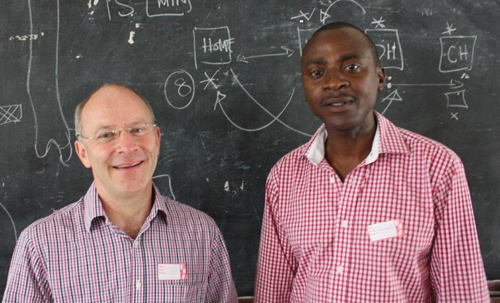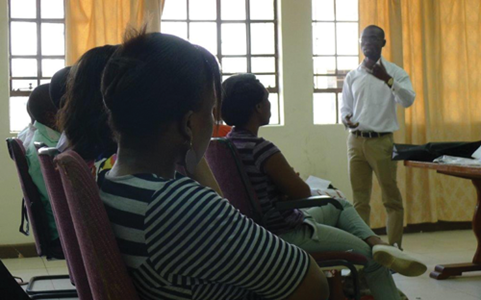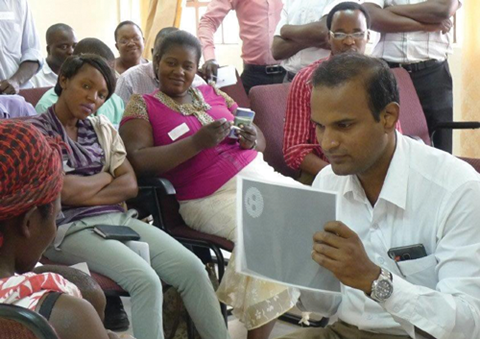Blinding eye disease in children can lead to a lifetime of dependence and non-productivity for the person afflicted. Sometimes a relatively simple condition such as a refractive error can lead to irreversible disability that could, if caught in time, have been avoided. Other times an operation, carried out early enough, can minimise visual loss and allow a child to benefit from normal education. Early treatment of fatal eye conditions such as retinoblastoma prevents not only blindness, but death.
These are all reasons why eye healthcare for children in African countries should be a priority. Specialisation of training in the West over the last three decades means that most of the children in the UK with eye disease will come under the care of a paediatric ophthalmologist. In Africa, by contrast, there are very few paediatric ophthalmologists and children are lucky to come under the care even of a general ophthalmologist. Developing paediatric ophthalmology services and the training of specialist personnel is thus a key target within the World Health Organization (WHO) / International Agency for the Prevention of Blindness (IAPB ) Global Action Plan [1].

Tim Lavy and Gerald Msukwa, who together have led the
development of paediatric ophthalmology training in Malawi.
In 2005 the Malawian Ministry of Health identified children’s eye health as a priority and, with assistance from the VISION 2020 LINKS Programme, signed a Memorandum of Understanding linking the Lions Sight First Eye Hospital (LSFEH) in Blantyre, Malawi (part of the Queen Elizabeth Central Hospital [2]) with Glasgow’s Royal Hospital for Sick Children (RHSC) to establish a paediatric ophthalmic service for the country. In 2006 the LINK started with reciprocal needs assessment visits, resulting in plans to train health workers and, in particular, Malawi’s first paediatric ophthalmologist – Dr Gerald Msukwa. Over the initial three years, progress was achieved in most areas, but training Dr Msukwa on short visits was very difficult. Sightsavers International agreed to sponsor him to go to CCBRT Hospital [3] in Dar es Salaam for a six-month paediatric ophthalmology fellowship. Dr Lavy from RHSC Glasgow, coincidentally, took a sabbatical to CCBRT Hospital at the same time, thus becoming Dr Msukwa’s mentor.
For the second three years, we turned our attention outward to frontline ophthalmic health workers (Ophthalmic Clinical Officers – OCOs) across the country. A paediatric ophthalmology training course was designed for OCOs in Malawi, teaching them how to measure visual acuity in children and recognise, manage and appropriately refer to Blantyre children with key eye conditions. By a process of trial and error with feedback and ‘brainstorming’ sessions, the training course evolved through several iterations, changing significantly every year. For the final three years, with the content still changing, we have been working towards handing the course over to all-Malawian delivery. Dr Chatonda Manda, Malawi’s second paediatric ophthalmologist, has recently returned after six-month fellowship training in India and will be course leader.
“There is so much still be to be done in Malawi but with the right individuals rightly placed and a widespread understanding of the essence and practices of paediatric ophthalmology,I am optimistic for how things will grow.”
Over the life of the LINK we have learned from our mistakes. We have always sought solutions to meet specifically Malawian needs. For example, we have designed and produced two different visual acuity charts, with the assistance of both Caledonian and Glasgow universities, introduced the new use of high powered ‘flippers’, and based our course on a Malawian approach to examining a child. Our course emphasises an understanding of visual development and amblyopia and includes several sessions on practical skills with clinical cases.
To date we have trained over 90% of all OCOs in Malawi and are now catching each year’s new OCOs as they graduate, as well as optometrists and trainee ophthalmologists.
Key individuals trained by the course are now located all round the country, allowing Drs Msukwa and Chatonda to tap into a network of professionals with a common paediatric understanding.
Huge thanks are due to the Scottish Government who have provided three cycles of three years’ funding and also to other funders, including Anne Gloag of Stagecoach who funded the course for one year.
Dr Tim Lavy, Lead Paediatric Ophthalmologist from the Scotland LINK team:
“I feel privileged to have been part of this LINK and the journey we have come on in the last 10 years. A large number of individuals from across Scotland have joined the team for one or more of our visits, each sharing expertise and insights. It is these insights and an openness on all our parts to try new ideas and approaches that has allowed us to make a number of mistakes and, more importantly, a number of great strides forward. Gerald Msukwa and now Chatonda Manda have been the right people at the right time for paediatric ophthalmology in Malawi. There is so much still be to be done in Malawi but with the right individuals rightly placed and a widespread understanding of the essence and practices of paediatric ophthalmology, I am optimistic for how things will grow from now onwards. I hope to be a witness to this.”

OCOs practising using +5.00/-5.00 flippers on a child patient.
Dr Gerald Msukwa, Consultant Paediatric Ophthalmologist, Lions Sight First Eye Hospital, Blantyre, Malawi:
“The Blantyre-Glasgow LINK came at a time that I really needed help in my professional growth. Having just done my paediatric fellowship there wouldn’t have been any better team than the Glasgow one to guide me in building up my confidence and my own team. Two years down the line we started conducting the paediatric ophthalmology course. The impact has been tremendous. The enthusiasm from participants who have passed through training has been great. The amount of referrals has improved. We are now seeing much younger children presenting for surgery than before. A lot more people seeking a second opinion on cases. It has been a wonderful LINK.”
Neil Drain, Optometrist Director, Specsavers Kirkintilloch, Scotland:
“After an initial visit in 2010 I was invited back to Malawi in 2012. The delegates from 2011 had requested that some refraction was included within the syllabus. The course was held in Blantyre and I prepared thoroughly, determined to teach all the OCOs how to refract over a two-day period. Unsurprisingly this was less than a resounding success and despite the delegates requesting retinoscopes we decided to adapt the refraction element of the course, concentrating instead on the detection of gross refractive error. “We have incorporated a demonstration of refractive error into the course, allowing the delegates to complete simple tasks as if they were a high myope or hyperope. This ingrains the devastation caused by uncorrected refractive error and the barriers to education and independence experienced by these children. A simple +5.00/-5.00 flipper set helps the delegates detect gross refractive error and allows them to refer on to an optometrist for visual correction and hopefully a hugely improved quality of life. “Coming from a high street optometry background, travelling to Malawi with a multidisciplinary group of paediatric specialists has allowed me to improve my own skills and knowledge. The experts I travel with and meet in Malawi have added colour and variety to my professional and personal life. They all have different backgrounds, opinions and aspirations, which have caused me to question my own values. I would consider each of them a friend. “It is always a joy to visit Malawi. The country faces many challenges yet its beauty and the warmth and goodwill of its people always amazes. I am optimistic about its future and am committed to assisting it in what little way I can for many years to come.”

Picture chart designed for Malawi.
Dr Chatonda Manda, Consultant Paediatric Ophthalmologist, Lions Sight First Eye Hospital, Blantyre, Malawi:
“The course is very important to Malawi, and in particular to eye care providers. I participated in the 2014 course and I found it to be very important, as it improved my knowledge in paediatric ophthalmology. It also improved my confidence in evaluation of a paediatric patient. I was motivated to do paediatric ophthalmology subspecialisation after the 2014 course. This course provides more information to primary eye care providers who form the entry point of patients into the eye care system. Their lack of knowledge would mean poor healthcare for children. Each year the course sees massive growth of knowledge in participants.”

Chatonda Manda teaching OCOs during the 2016 paediatric ophthalmology course.
Janice Waterson Wilson, Specialist Orthoptist, Royal Hospital for Children, Glasgow:
“Being invited to join the VISION 2020 paediatric ophthalmology LINK in 2007 was such an amazing opportunity, it could not be missed. As an orthoptist, my role was to provide teaching of vision testing in children to OCOs who worked in the hospital in Blantyre, alongside one of my orthoptic colleagues. In the first year, we trained three OCOs, and helped them assess 187 children over three days! Year on year, the number of OCOs being trained grew, and the training course was then established. The thirst for knowledge and eagerness to learn new skills is always apparent when visiting Malawi. “Prior to the VISION 2020 LINK it was commonplace for a child not to have their vision checked as part of their assessment. The eye clinic staff lacked the equipment needed. The LINK has enabled them to receive adequate training, gaining the knowledge and expertise required for visual assessment of a child. Equipment packs were also provided through the LINK. Each person who has attended the course has received a pack, and also the OCOs trained prior to the course’s conception. Those who have been trained are therefore able to return to their workplace fully equipped to start assessing children. They are also able to transfer the knowledge and skills on to colleagues who have not yet had the opportunity to attend the course. Since the start of the VISION 2020 LINK, the provision of paediatric eye care services has improved. Malawi has taken many positive steps to ensure this too, including introduction of Optometry Degree and Diploma programmes. Without doubt, the VISION 2020 LINK has had a positive impact.”

Naveen Kumar, Optometrist at LSFEH, teaching OCOs how to test
children’s vision during the 2016 paediatric ophthalmology course.
Conclusion
This remarkable story of how the LINK between Blantyre and Glasgow has helped the national children’s eye service for Malawi to develop over a decade illustrates the value of a long-term training and capacity-building partnership in helping African eye units to bring about improvement. Strong working relationships and trusting personal friendships are key in bringing about long-lasting, sustainable change. Nowhere is this better illustrated than by the handover of the annual OCO paediatric ophthalmology training course to be run by the Malawian team.
Another 13 VISION 2020 LINKS are also working together to build paediatric ophthalmology services in another eight countries in Africa, building the skills of the whole eye care team, including enabling vision testing of children to become a routine part of the work of eye departments.
References
1. Global Action Plan 2014-2019. IAPB
http://www.iapb.org/advocacy/who-action-plan
Last accessed October 2016.
2. Queen Elizabeth Central Hospital Facebook page
https://www.facebook.com/pages/
Queen-Elizabeth-CentralHospital/116694315088948
Last accessed October 2016.
3. About us. CCRBT
http://www.ccbrt.or.tz/home/
Last accessed October 2016.
Acknowledgments:
The authors wish to acknowledge their enormous gratitude to the Scottish Government for its funding of this project over many years, without which the progress and achievements described here would not have happened.
COMMENTS ARE WELCOME








